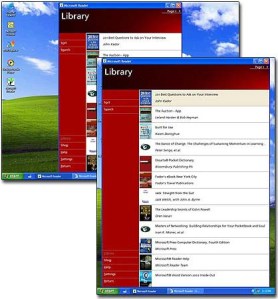
Way back in the year 2000—before the iPhone, before Facebook, before MySpace, and before 9/11—Microsoft launched Microsoft Reader, a free desktop application designed to serve as a digital reading library for desktop PCs, which the company then extended to Windows Mobile and UMPCs (remember those?). However, Microsoft Reader has largely been neglected by the software giant for the last four years, and now the company has officially announced its cancellation: no new content for Microsoft Reader will be available after November 8, 2011, and the product will be discontinued on August 30, 2012.
Microsoft says customers will have indefinite access to all content they have in the application’s .lit format, but the company is not going to offer users a way to migrate to another ereading platform, and after August 2012 support for Reader and the .lit format in Windows and future Microsoft platforms will not receive official support.
Microsoft gave no reasons for discontinuing Microsoft Reader, but the trends seem clear enough: where Amazon has had considerable success in the ereading market with its Kindle, competition amongst ereader vendors like Amazon, Barnes & Noble, Sony, and others is increasingly intense, and Apple has complicated matters with its iBookstore and in-app purchase policies that take 30 percent of every in-app sale. The bottom line is that Micosoft Reader never developed an ecosystem, but Kindle, Barnes & Noble, Kobo, and others all have working ereading solutions that embrace Windows as well as ereader devices. There’s no doubt there will be ereading solutions for Microsoft platforms going forward—including Windows Phone and Windows 8—but it’s looking less likely that they’ll be from Microsoft.


